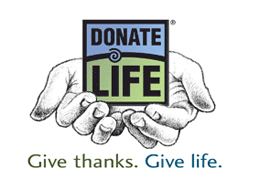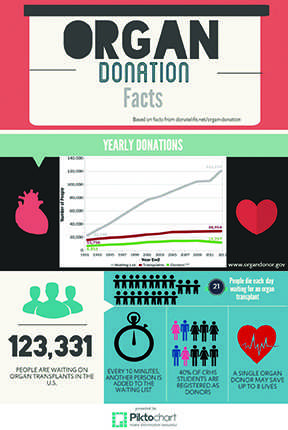Heart of gold
Lack of donors result in organ shortages throughout the nation

March 25, 2015
When the world discovered that organ transplants could be accomplished to potentially save the lives of millions, scientists and medical professionals alike were thrilled. Such a breakthrough would revolutionize medicine forever, and could potentially be the saving grace for the people with incurable diseases and conditions. But now, hundreds of thousands of Americans lay on their deathbed awaiting a possible donation, some even passing before they get the chance, and what at first seemed to be a cure, seems to be a killer as well.
Approximately 21 people die each day in the United States awaiting a transplant, with many more stuck years behind on the waiting list. As demands for organ donations have increased, patients have been pushed further and further back on the list, some even told to wait up to six years before they can receive a possible donation. The world currently has an inadequate supply of organ with the slowly decreasing number of organ donors. As numerous new cases come in to the question of who gets to live, this complex problem rises to a whole new level.
The number of possible donors is quickly decreasing, causing some desperate Americans to perpetuate organ trafficking by purchasing organs from the black market overseas. In poverty-ridden countries, people are often scammed into donating their organs for money that may help them support their families. Instead, donors are left without the sum they were promised and often suffer many health complications. Innocent people are continuously victimized by these crimes because their lack of awareness leaves them vulnerable to be manipulated to donate their organs. In more extreme cases, children and young adults are kidnapped and killed to have their organs harvested for a good sum to sell to desperate bidders.
According to the National Organ Transplant Act of 1984 (NOTA), it is illegal to “transfer any human organ for valuable consideration”; this prohibits the exchange of an organ for something of material value, such as money, jewelry, or other goods. However, though altruistic organ donations are ideal, not many potential donors have the incentive to donate their organs to a complete stranger. But although NOTA hoped to limit organ trafficking in the United States by prohibiting organ trade in the United States, it instead provides an alternative monetary motivation for wait list patients to look overseas.
We can stop contributing to this harsh reality if awareness about organ donation is increased and and we overcome negative preconceptions of the donation process that are based around myths and scandals. Though a majority of Americans are supporters of organ donation, less than a third are actually registered. A single donor can save up to 8 lives, and in the state of Texas there are no age restrictions becoming a donor. Over 123,331 Americans are on the waitlist for organ transplants. Although it seems like an enormous undertaking, anyone can make a difference in the fight against organ trafficking.
For more information on organ donations and how you can become a donor, you can visit http://donatelife.net/donate-life-info/ or http://organdonor.gov/index.html.



Roba • Apr 15, 2015 at 11:16 pm
beautifully written meherina 🙂
Hannah Hassel • Apr 8, 2015 at 11:21 am
This is amazing Meherina!